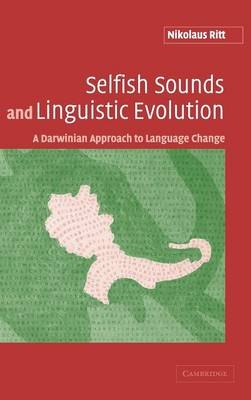
Selfish Sounds and Linguistic Evolution
A Darwinian Approach to Language Change
Seiten
2004
Cambridge University Press (Verlag)
978-0-521-82671-6 (ISBN)
Cambridge University Press (Verlag)
978-0-521-82671-6 (ISBN)
This book takes an exciting new perspective on language change, by explaining it in terms of Darwin's evolutionary theory. Nikolaus Ritt shows how the constituents of language can be regarded as mental patterns, or 'memes', which copy themselves from one brain to another when communication and language acquisition take place.
This book takes an exciting perspective on language change, by explaining it in terms of Darwin's evolutionary theory. Looking at a number of developments in the history of sounds and words, Nikolaus Ritt shows how the constituents of language can be regarded as mental patterns, or 'memes', which copy themselves from one brain to another when communication and language acquisition take place. Memes are both stable in that they transmit faithfully from brain to brain, and active in that their success at replicating depends upon their own properties. Ritt uses this controversial approach to challenge established models of linguistic competence, in which speakers acquire, use, and shape language. In Darwinian terms, language evolution is something that happens to, rather than through, speakers, and the interests of linguistic constituents matter more than those of their human 'hosts'. This book will stimulate debate among evolutionary biologists, cognitive scientists and linguists alike.
This book takes an exciting perspective on language change, by explaining it in terms of Darwin's evolutionary theory. Looking at a number of developments in the history of sounds and words, Nikolaus Ritt shows how the constituents of language can be regarded as mental patterns, or 'memes', which copy themselves from one brain to another when communication and language acquisition take place. Memes are both stable in that they transmit faithfully from brain to brain, and active in that their success at replicating depends upon their own properties. Ritt uses this controversial approach to challenge established models of linguistic competence, in which speakers acquire, use, and shape language. In Darwinian terms, language evolution is something that happens to, rather than through, speakers, and the interests of linguistic constituents matter more than those of their human 'hosts'. This book will stimulate debate among evolutionary biologists, cognitive scientists and linguists alike.
Nikolaus Ritt is Professor and Head of the English Department at Vienna University.
1. Introduction; 2. The historical perspective; 3. Approaching 'language change'; 4. The Darwinian approach; 5. Generalising Darwinism; 6. Towards an evolutionary theory of language; 7. What does all this imply for the study of language change?; 8. How to live with feet, if one happens to be a morph-meme; 9. The prosodic evolution of English word forms or the great trochaic conspiracy; 10. Conclusion.
| Erscheint lt. Verlag | 27.5.2004 |
|---|---|
| Verlagsort | Cambridge |
| Sprache | englisch |
| Maße | 152 x 229 mm |
| Gewicht | 670 g |
| Themenwelt | Geisteswissenschaften ► Psychologie |
| Geisteswissenschaften ► Sprach- / Literaturwissenschaft ► Sprachwissenschaft | |
| Naturwissenschaften | |
| ISBN-10 | 0-521-82671-3 / 0521826713 |
| ISBN-13 | 978-0-521-82671-6 / 9780521826716 |
| Zustand | Neuware |
| Haben Sie eine Frage zum Produkt? |
Mehr entdecken
aus dem Bereich
aus dem Bereich
Das umfassende Standardwerk auf der Grundlage der aktuellen amtlichen …
Buch | Hardcover (2024)
Duden (Cornelsen Verlag)
CHF 48,95
und wie man sie vermeidet
Buch | Softcover (2022)
C.H.Beck (Verlag)
CHF 19,55


